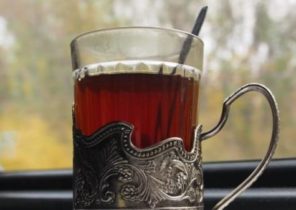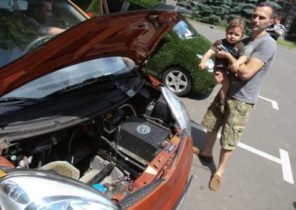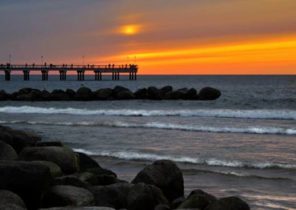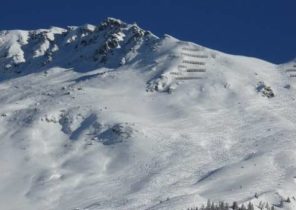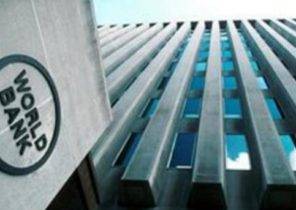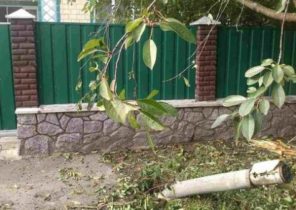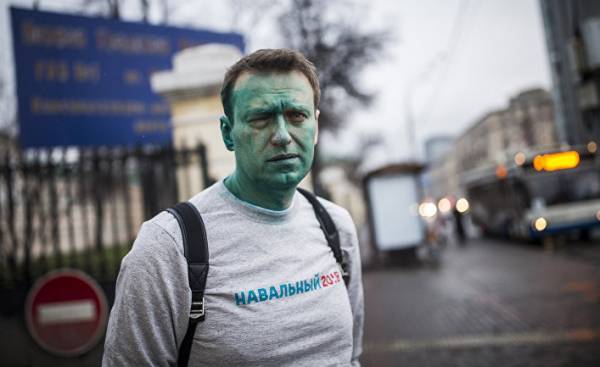
Alexei Navalny is in good spirits for a man who basically can not take a step to the side without having to not to be offended, not to be attacked or not be under arrest. Earlier this month he was released after 15 days of detention in a Russian prison. And on Thursday in Moscow he was attacked by unknown, pouring green paint on his face, and this is the second such attack on him over the past few months. However, his usual restrained smile, seems to not descend from his face.
Perhaps it is because Vladimir Putin is preparing to participate in the fourth presidential election in March next year, and the Bulk threatens to bring some excitement in the desert landscape of Russian politics. Navalny was in jail because of the protest, he called for a March 26. She surprised everyone with its scale. In Moscow alone, police arrested more than a thousand people and imprisoned dozens of people. Although the number of participants was small in absolute numbers, people took to the streets in dozens of Russian cities, which was a new and worrying development for the Kremlin.
Held in jail for two weeks did not seem demoralized Bulk, gave him extra energy. “In prison there were other people, and they all participated in the protest, says Navalny, when I meet him at his office in one of Moscow’s business centers. — When I passed them, they asked the question: “When will the next protest?” They didn’t ask, will be there at all the protest, they wanted to know about specific dates”.
40-year-old Navalny, a lawyer turned social activist, is the head of the Fund of struggle against corruption, investigations regarding the personal property of people from the inner circle of Putin. Bulk for several years was on the periphery of a liberal policy and was known as a Russian nationalist, but then, in the Wake of the protests that occurred in 2012 before the presidential elections in Russia, he turned into the main opposition leader.
On the day of his arrest, the security personnel came to his office. They Packed, and then took all the electronics were there. By the time of my visit nothing was returned. It works on the MacBook with attached on it a sticker with the Russian word of three letters — “a THIEF.” Grotesque and caricature Putin’s face staring at me through the letter O.
Dmitry Peskov, Putin’s spokesman, looking at us with Fund published this calendar, which lists its main investigations. In 2015 Navalny argued that Sands spent their honeymoon on one of the world’s most expensive yachts. He also noted that Sands is a limited edition watch that cost hundreds of thousands of pounds (Peskov denied a boat trip, and about the watch said that they were a wedding gift). Navalny has also accused the wife of Deputy Prime Minister Igor Shuvalov to use a private jet for transportation in all of Europe their dogs breed Corgi. In addition, it has at its disposal made by a drone video of the Palace type residences of other Ministers and senior officials.
The facility recently conducted the Bulk of the investigation was the current Prime Minister Dmitry Medvedev, once acted as custodian of office. Navalny claimed that this man, who was considered in his time the beginning of a new liberal era in Russia, actually is the owner of luxury residences, vineyards and yachts. “It’s really, really pissing people off,” says Navalny. That’s what the investigation against Medvedev has forced many to take to the streets in March. “Everything has been believed that Medvedev is untenable and ineffective, but he turned out to be untenable, inefficient and a billionaire.”
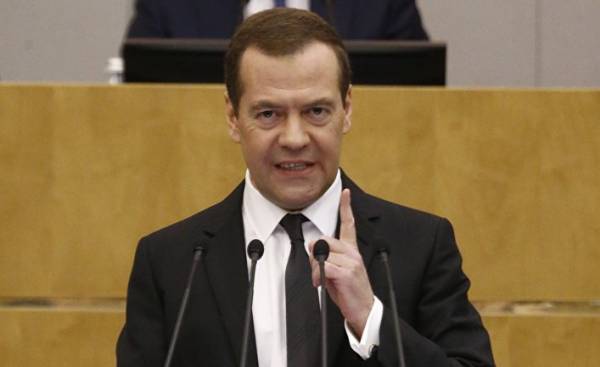 © REUTERS, Sergei Carrier-Minister of the Russian Federation Dmitry Medvedev
© REUTERS, Sergei Carrier-Minister of the Russian Federation Dmitry Medvedev
Medvedev has denied the allegations, calling them “lies of a political crook.” But, despite the fact that state television has ignored these accusations, about 20 million people watched the Bulk of the video on YouTube. According to Navalny, amid the ongoing impoverishment of large segments of the Russian population, the protests will only increase. Even the police are outraged by the existing government corruption, according to Navalny.
“Two policemen and I was arrested, Navalny has been arrested multiple times and detained, said: “We support you, you’re a good guy, we’ve seen this movie, just making fun of Medvedev, but Putin’s foreign policy is good. But, of course, internal politics in the country is bad.” This is consonant with the fact that I heard during my travels in Russia: people are desperate from its situation, however, they believe that Putin’s intervention in Ukraine and Syria saved the world from the hegemony of the United States.
And now Putin not only in Russia looks like the Almighty. I asked Navalny about an ongoing anxiety about the Kremlin’s interference in the West. He does not take seriously the idea that Donald trump is in some way a “Russian agent”. Navalny believes that the West fell into the hysteria about Russia, however, in his opinion, it is obvious that the Kremlin will try to secure his influence wherever possible, while Western politicians were surprisingly cheap.
“For these guys a billion dollars is nothing,’ he says, nodding his head to the side a calendar with images of people from the inner circle of Putin. — And just for one billion dollars you can buy all the small parties in Europe.”
According to Navalny, during his campaign in the regions it is doing everything possible to counter the television propaganda regarding the newfound Russian influence. “Okay, that’s fine, Putin promised to restore Palmyra, but why don’t you pay attention to the condition of the roads in town? What, in your opinion should be priorities? Repair of roads in the Voronezh and Stavropol or restoration of Palmyra? Americans have money. Let them restore the Palmyra, and we need to concentrate on my problems.”
A few days later I met again with the Bulk of this time in Chelyabinsk, a city located two hours East of the Russian capital. This is one of the stops covering dozens of cities in a tour that spends the Bulk scheduled for March 2018 presidential election. Chelyabinsk is an industrial town with a population of over a million people, and it’s filled with signs of decline, was built in Soviet times, the factories pollute the air that when inhaled, trigger the same sensations as mustard wasabi. This is a significant region for Putin, but also the place where the economic difficulties of the last few years is particularly acute. Navalny and his team arrive in the city later in the evening after a furious six-hour trip from Tyumen, where he had opened his campaign headquarters.
In other cities during the campaign he was attacked, insulted him in that moment, when he tried to communicate with local residents. The phone was made warning of a bomb threat during his performances, which forced the police to suspend the meeting and evacuate its members. In Chelyabinsk the day passes relatively peacefully. In the morning he talks with representatives of the local youth who want as volunteers to assist him in the presidential campaign.
We are talking about a couple hundred people, many of whom are representatives of the emerging class of hipsters. This is an impressive group, but these people represent a natural base of support for Navalny. More interesting to observe how his message is perceived by the evening of the same day as he speaks during a protest held by environmental groups against the construction of new mines and processing plant of raw materials, which will further pollute the atmosphere.
Local authorities are trying to protect themselves from any risks in connection with the arrival of this visitor from the capital. Children’s Playground, where the rally is surrounded by five police buses, the staff of special forces of police in helmets for astronauts, the crowd of Cossacks, ready to rush into battle, and several muscular young men who came here, no doubt, by the authorities in order to prevent this event.
“This meeting of environmentalists, please, behave yourself”, asks, addressing the audience, frazzled by the organizer at the time when about 50 people starting to chant “Get out!” and “Shame!” at the mention of the name Navalny.
He is smiling up on stage. “Let me get something out to explain — I have a microphone and you don’t have it, so it’s a bit pointless” — fun he says, in the meantime, young people continue to chant their slogans. “But, look, if you don’t like me, then don’t vote for me. I only arrived today, and in the evening I left. However, the plant will remain here, and he will continue to poison you and your family. Do you want it? Continue to chant, if you want it”. Suddenly, the instigators calm down. Some of them look a bit confused listening to the Bulk begins to expose sharp criticism of Putin’s “crooks and thieves” that steal their money and poison their city.
Russia is a country where politicians rarely dealing with anything as risky as meeting with real people, and when they accidentally occur, end in disaster — the evidence of that is helpless Medvedev during his visit to the Crimea, where he said the elderly woman, unhappy with the low level of pensions: “no Money, but you hold on good health and goodbye”, and then continued his leisurely walk. Many opposition members also hopelessly divorced from the masses is a curse Russian liberals since Czarist times. However, regardless, I love Russian observers Navalny, or not, they agree that he has a remarkable political instinct and a strong charisma. His fiery cocktail consisting of liberalism, nationalism and populism, provides him the support of many people in the country.
“People say he’s a provocateur, that he receives money from abroad, says 62-year-old Hope, hearing his speech in Chelyabinsk. — Is it true? I don’t know. At least he came to talk to us, at least he says the right things. Here at all nothing ever happens and no one ever listens.”
In Russia, where none of the conspiracy theories seems odd, some think Navalny a puppet in the hands of prey of the West, while others suspect that someone in the Kremlin supports it — maybe even Putin, who uses it for pouring dirt on inconvenient members of the elite. “I would trust him more if he died, half in jest said one Muscovite, a few days before this interview. — How can he do all these and still be alive? He must have a powerful patron.”
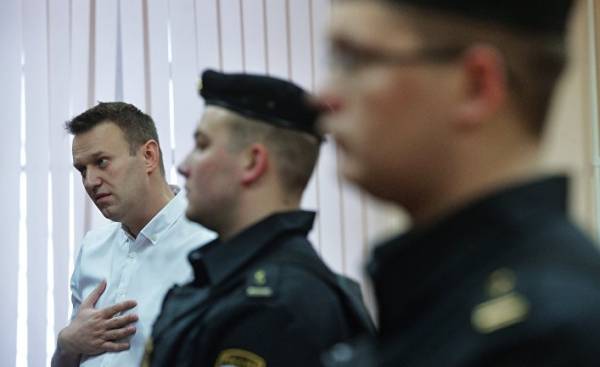 © RIA Novosti, Alexey kudenko | go to fotobelka Navalny in the Leninsky district court of Kirov
© RIA Novosti, Alexey kudenko | go to fotobelka Navalny in the Leninsky district court of Kirov
I ask this question of Bulk, and in parentheses, bring him for that apology. “Fucking idiots,’ he said, irritably. “Why don’t I kill? Why are you not in jail?” People keep asking me such questions. Look, I don’t have an answer. Most likely, in my opinion, they couldn’t put me in jail, when he had the opportunity, but then, after a certain time, make it become harder.”
It is possible that some leads of his investigation he actually received from the Kremlin insider under external loyalty within the Russian elite are brutal struggle for power and influence. But even if Putin’s people once used Navalny, now they are already trying to decide what to do with it.
The Kremlin used a different strategy to prosecute in court, kept him under house arrest and even put his brother, hoping in this way to exert pressure on him. Sometimes it even tried to honestly defeat — he was allowed to participate in elections of the mayor of Moscow in 2013. Despite the lack of access to state television, Navalny received 27% of votes, which alarmed the Kremlin, and in 2014 he was already under house arrest and waiting for a new, politicized process.
I then visited him in his modest apartment, located not in a posh area on the outskirts of Moscow, where he still lives with his wife Julia and two children. He is just as rebellious, however, it seemed that he was overshadowed as a result of the recently Patriotic atmosphere. Almost nobody noticed his absence on the political stage, since it within a few months it was forbidden to talk with the press and leaving his apartment.
But now, when the “Crimea effect” is waning, and the economic difficulties continue, the Kremlin becomes more difficult to mobilize the population on the eve of next year’s elections. The presidential administration is trying to find someone who would have to be a formal opponent of Putin, Navalny, however, is unlikely to get the opportunity. “Too much unpleasant noise, said one Kremlin source. — They want a candidate who will be able to create the impression of competition, but it will not be subjected to attack Putin and his inner circle. They need a candidate who understands where the boundary, whereas the Bulk do not recognize any limits.”
Instead, the Kremlin went on the offensive. Last week, Russian media reported the existence of a secret Kremlin directives that are prescriptive to “demonize” the Bulk, and after a while, of course, on YouTube there is a video where it is compared with Hitler, and is there processed in Photoshop image Bulk outstretched in a Nazi salute hand and a swastika on the sleeve. There were also reports that University students were shown this video in the “training programs”, hoping in this way to prevent their participation in protests.
This video is a clumsy attempt to discredit, but to the Bulk, indeed, there are questions about his nationalistic views. A few years ago he posted a number of disturbing video in which he was presented in the form of dentist complaining that dental caries destroys healthy teeth, and the moment was shown to migrant workers. In another video he talks about his support for weakening control over the sale of weapons, and in this monologue, he apparently compares migrants with cockroaches.
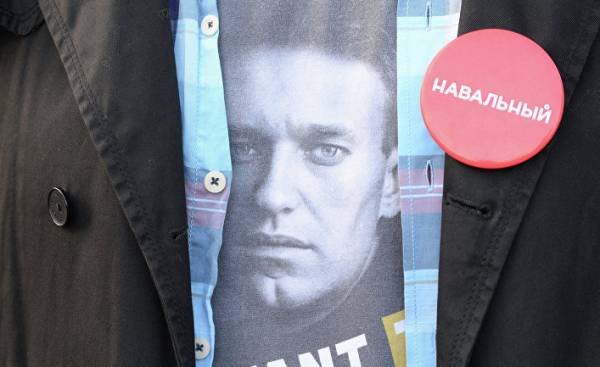 © RIA Novosti, Ilya Pitalev | go to potbanging supporters of Alexei Navalny on Bolotnaya square
© RIA Novosti, Ilya Pitalev | go to potbanging supporters of Alexei Navalny on Bolotnaya square
I ask whether he regretted that posted these videos. But he, apparently, has no regrets. He sees the power that can refer to both the liberals and the nationalists. But what about comparing migrants with cockroaches? “It’s poetic license,” he says. That is, there is nothing in those videos and in that period, what would he regret? “No,” he says again, and makes it firmly.
Perhaps he cynically believes that by providing a support of the liberal elite, he is using anti-immigrant rhetoric to gain support for a wider audience. Of course, most of the opposition politicians, even if they don’t like the Bulk, you know that he is the best hope in terms of revitalizing anti-Putin sentiment.
Navalny announced a June 12 new protests across Russia. The turnout on this day will serve as a good indicator of whether held in the past months to protest the temporary success, or they are the start of something seriously threatening to the Kremlin. “You can arrest 100 people and put them in jail for 15 days. OK, you can imprison 1000 people. What’s next?”. In the meantime, he plans to make dozens of trips to Russia to attract volunteers willing to assist him in the presidential race.
After a long day in Chelyabinsk Bulk seems tired, but he gladly gives autographs to people who come to our table in a cafe. I say that it’s been 100 years since the return of Vladimir Lenin at the Finnish station in St.-Petersburg — it happened in April 1917, and he made the radical thesis that nobody took seriously — at least initially. The majority of Russian, taking into account the combination of real historical tragedy and cautious information policy of the Kremlin, suspicious of revolutions and uprisings. I ask Bulk: is there a danger that Putin’s actions in recent years, turned into a self-fulfilling forecast persistent warnings of the Kremlin regarding that any political change will be a disaster for Russia?
There is no space for a healthy opposition, and any revolutionary uprising will undoubtedly be brutally suppressed. He sighs as the teacher, frustrated by the particularly slow student.
“Look, this mode, of course, would retaliate. However, all the autocratic regimes in some point ceased to exist. Who would have thought in 1985 that the Soviet Union would soon collapse? No. Who could say in 2010 that Arab regimes in three months will cease to exist? In 2012, I said that this regime will last another two years, but I was wrong, and then I stopped making predictions. But sooner or later it will end.”
